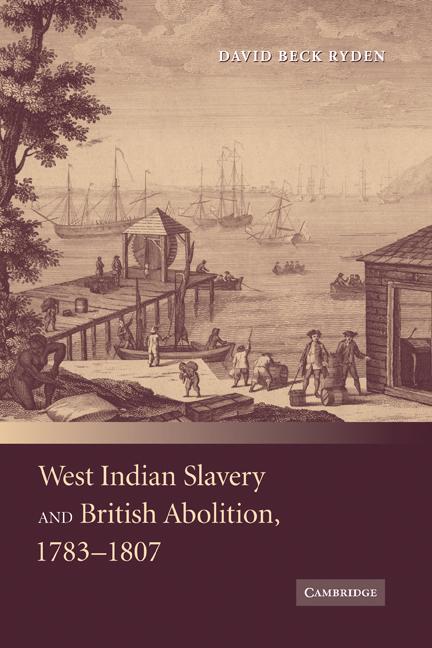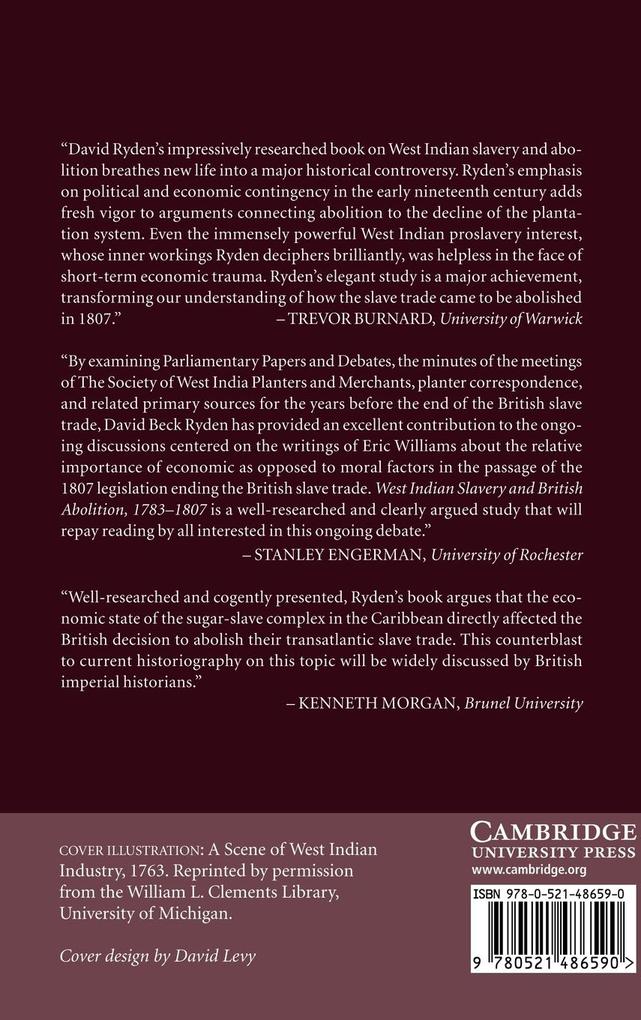
Zustellung: Fr, 25.07. - Di, 29.07.
Versand in 7 Tagen
VersandkostenfreiThis book examines the political and economic motivations behind the final decision to abolish the British slave trade.
Inhaltsverzeichnis
1. Producing a peculiar commodity; 2. The Atlantic economy's political economic power; 3. Jamaican planters and the London West India interest; 4. The production and distribution of Jamaican muscovado; 5. Duties, drawbacks, and the uncommitted mercantilists; 6. The management of slaves in Jamaica; 7. Abolition and colonial reform; 8. Antiabolition and colonial rights: the defense of the slave trade; 9. A business paradox: rising productivity and collapsing profitability; 10. Rapid decline and abolition.
Produktdetails
Erscheinungsdatum
30. Januar 2010
Sprache
englisch
Seitenanzahl
352
Autor/Autorin
David Beck Ryden
Verlag/Hersteller
Produktart
gebunden
Gewicht
722 g
Größe (L/B/H)
235/157/25 mm
ISBN
9780521486590
Entdecken Sie mehr
Pressestimmen
'David Ryden's impressively researched book on West Indian slavery and abolition breathes new life into a major historical controversy. Ryden's emphasis on political and economic contingency in the early nineteenth century adds fresh vigor to arguments connecting abolition to the decline of the plantation system. Even the immensely powerful West Indian proslavery interest, whose inner workings Ryden deciphers brilliantly, were helpless in the face of short-term economic trauma. Ryden's elegant study is a major achievement, transforming our understanding of how the slave trade came to be abolished in 1807.' Trevor Burnard, University of Warwick 'By examining Parliamentary Papers and Debates, the minutes of the meeting of The Society of West India Planters and Merchants, planter correspondence, and related primary sources for the years before the ending of the British slave trade, David Beck Ryden has provided an excellent contribution to the ongoing discussions centered on the writings of Eric Williams about the relative importance of economic as opposed to moral factors in the passage of the 1807 legislation ending the British slave trade. West Indian Slavery and British Abolition, 1783-1807 is a well-researched and clearly argued study that will repay reading by all interested in this ongoing debate.' Stanley Engerman, University of Rochester 'Well researched and cogently presented, Ryden's book argues that the economic state of the sugar-slave complex in the Caribbean directly affected the British decision to abolish their transatlantic slave trade. This counter-blast to current historiography on this topic will be widely discussed by British imperial historians.' Kenneth Morgan, Brunel University 'One of the many strengths of this book is its analysis of the planter lobby in Britain and its gradual loss of political influence. Another strength is the emphasis it puts on the growth of the West Indian economy at the end of the eighteenth century, and the ability of the planter class to experiment and innovate.' Times Literary Supplement '... this book is a testament to Ryden's expertise in economic analysis and to his thorough archival research in the United Kingdom, the United States and Jamaica.' New West Indian Guide
Bewertungen
0 Bewertungen
Es wurden noch keine Bewertungen abgegeben. Schreiben Sie die erste Bewertung zu "West Indian Slavery and British Abolition, 1783-1807" und helfen Sie damit anderen bei der Kaufentscheidung.









